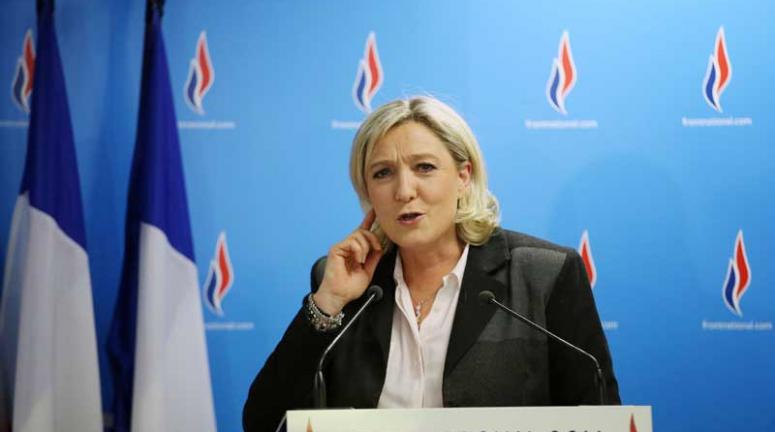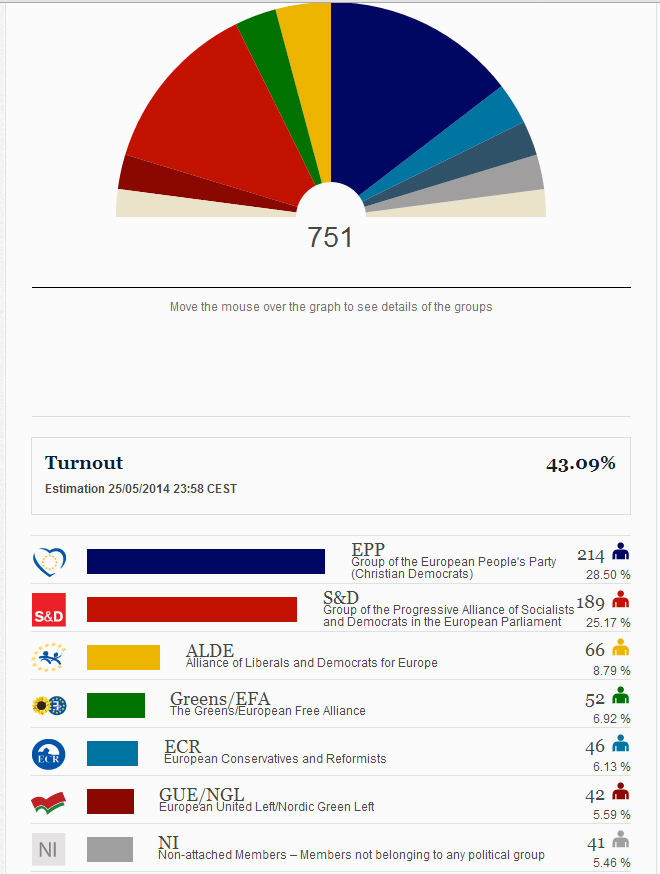FINANCIAL TIMES: Anti-EU parties celebrate election success

The FN, led by Marine le Pen, was one of four anti-establishment parties to finish top in their country’s EU parliamentary elections. Britain’s UK Independence party, led by the bombastic former commodities broker Nigel Farage, came first, as did Denmark’s far-right Danish People’s party and Greece’s radical leftist Syriza.
The populist parties that will make up at least a quarter of the new parliament are a polyglot group, ranging from the far left – Syriza took 26.5 per cent while the largely unknown Podemos party stunned Spain by taking 8 per cent – to the ultranationalist right – Hungary’s Jobbik finished second with 14.7 per cent and Greece’s neo-Nazi Golden Dawn finished third with 9.4 per cent.
But taken together, their success ate into the normally comfortable lead Europe’s three traditional mainstream parties maintain in Brussels. Even the election’s victors, German chancellor Angela Merkel’s centre-right European People’s party, saw their support drop 7 percentage points compared with five years ago.
In Britain, Ukip’s victory was the first time since 1910 that a party other than the Conservatives or Labour had won a national election. Mr Farage said his party was no longer a splinter group but the “third force” in national politics ahead of the 2015 general election.
Fabian Zuleeg, head of the Brussels-based European Policy Centre said the results “mean major difficulties for the European integration project, particularly because of France”.
“The mainstream parties are all now going to try to attract the anti-EU vote,” he said. “That isn’t working, but the argument we’re hearing already is: ‘We didn’t go far enough.”
No result is likely to have a bigger impact on Brussels than Ms Le Pen’s victory in France, which along with Germany is a co-founder of the EU and the engine that has driven the European project for half a century.
France’s President François Hollande brought together his key ministers for an emergency inner cabinet meeting on Monday morning to discuss the election results. Before the meeting, Manuel Valls, the prime minister, said the EU must react to the breakthrough by the FN and other eurosceptic parties.
“I am convinced that Europe can reorientate to give greater support to growth and employment, which it has failed to do for years,” he said in a radio interview. He promised more tax cuts in France.
A handful of populist parties performed below expectations, particularly in Italy where the anti-establishment Five Star Movement led by comedian Beppe Grillo finished a distant second to the centre-left Democrats of Prime Minister Matteo Renzi, who nearly doubled Mr Gillo’s total with a commanding 40.1 per cent of the vote.
Similarly, the Freedom party of anti-Muslim provocateur Geert Wilders, finished third in the Netherlands at 13 per cent despite spending weeks leading opinion polls.
Still, the number and breadth of the populist gains were unexpected. In France, FN took 26 per cent of the vote, with the main opposition UMP on 21 per cent and the governing Socialists on 14 per cent.
FN is likely to become the fourth-largest party in the new Eueopean Parliament, taking 25 of France’s 74 seats, and Britain’s Ukip is projected to become the fifth-largest; as of early Monday, it had won 23 seats.
But other, smaller groups surprised as well. In Germany, where anti-EU sentiment has historically never been a serious part of the national debate, the eurosceptic Alternative for Germany party polled better than expected with 7 per cent of the vote, enough to win 7 seats in the new parliament.
In Spain, where despite sky-high unemployment following years of gruelling austerity, the two mainstream parties were expected to dominate, the ruling centre-right Popular party saw its support cut in half to just 26 per cent. Podemos, a far left party headed by a political science professor, took nearly 8 per cent and the United Left party came in third with 10 per cent.
Austria’s far-right Freedom party was set to finish third with 20 per cent of the vote – against 12.7 per cent in 2009.
“Populist politicians like Mr Farage and Ms Le Pen are winning so many votes because they are the anti-establishment voice,” said Tim Newark, author of Protest Vote. “Voters are fed up with mainstream party politicians who all sound the same and can deliver very little. The populists have an authenticity about what they say . . . voters like that.”
Pablo Iglesias, the leader of Podemos, vowed on Sunday night to work closely with deputies from other southern European countries hit by the crisis: “We don’t want to be a colony of Germany and the Troika [the European Commission, European Central Bank and the International Monetary Fund],” he told cheering supporters.
By Peter Spiegel in Brussels and Hugh Carnegy in Paris
Additional reporting by Tobias Buck in Madrid
See here the provisional results: results-election2014.eu
Source: ft.com
Fiți la curent cu ultimele noutăți. Urmărește TIMPUL pe Google News și Telegram!

